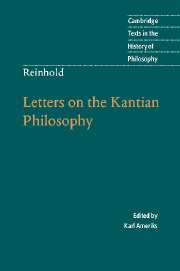Book contents
- Frontmatter
- Contents
- Preface
- Introduction
- Chronology
- Further reading
- Note on the texts and translation
- Letters on the Kantian Philosophy
- First Letter: The need for a Critique of Reason
- Second Letter: The result of the Kantian philosophy on the question of God's existence
- Third Letter: The result of the Critique of Reason concerning the necessary connection between morality and religion
- Fourth Letter: On the elements and the previous course of conviction in the basic truths of religion
- Fifth Letter: The result of the Critique of Reason concerning the future life
- Sixth Letter: Continuation of the preceding letter: The united interests of religion and morality in the clearing away of the metaphysical ground for cognition of a future life
- Seventh Letter: A sketch of a history of reason's psychological concept of a simple thinking substance
- Eighth Letter: Continuation of the preceding letter: The master key to the rational psychology of the Greeks
- Appendix: the major additions in the 1790 edition
- Index
- Cambridge texts in the history of philosophy
Second Letter: The result of the Kantian philosophy on the question of God's existence
Published online by Cambridge University Press: 05 June 2012
- Frontmatter
- Contents
- Preface
- Introduction
- Chronology
- Further reading
- Note on the texts and translation
- Letters on the Kantian Philosophy
- First Letter: The need for a Critique of Reason
- Second Letter: The result of the Kantian philosophy on the question of God's existence
- Third Letter: The result of the Critique of Reason concerning the necessary connection between morality and religion
- Fourth Letter: On the elements and the previous course of conviction in the basic truths of religion
- Fifth Letter: The result of the Critique of Reason concerning the future life
- Sixth Letter: Continuation of the preceding letter: The united interests of religion and morality in the clearing away of the metaphysical ground for cognition of a future life
- Seventh Letter: A sketch of a history of reason's psychological concept of a simple thinking substance
- Eighth Letter: Continuation of the preceding letter: The master key to the rational psychology of the Greeks
- Appendix: the major additions in the 1790 edition
- Index
- Cambridge texts in the history of philosophy
Summary
What I claimed in my last letter concerning the lack of a universally satisfying answer to the question of God's existence actually applies more to the grounds and proofs for this answer than to the answer itself. An affirmative answer to this question is given by all eras and peoples with a majority vote, which on close inspection is nothing less than unanimous. This judgment, which is pronounced by such universal agreement and confirmed by the equally universal interest of humanity, is therefore a judgment of common sense and must rest on irrefutable and universally evident grounds. These grounds, taken together as a whole, must have been ever present and continuously operative and, consequently, are capable of being discovered and developed but not invented or altered. Nevertheless, the actual role that [128] reason – when viewed as a separate faculty – had in these grounds could have remained forever unrecognized, undetermined, and unproven without this role having therefore been less real or the arguments themselves less persuasive. The seven elementary colors have always radiated the color white as a result of their uniform mixture – even before Newton discovered the existence of these seven elementary colors in every ray of light and the effect of their uniform mixture. A Newtonian who would deny sensation of the color white in all those who either do not know or do not wish to concede the theory of the seven colors would be acting just as foolishly as a metaphysician who would accept no conviction in God's existence that is not built explicitly on grounds of reason.
- Type
- Chapter
- Information
- Reinhold: Letters on the Kantian Philosophy , pp. 18 - 27Publisher: Cambridge University PressPrint publication year: 2006



